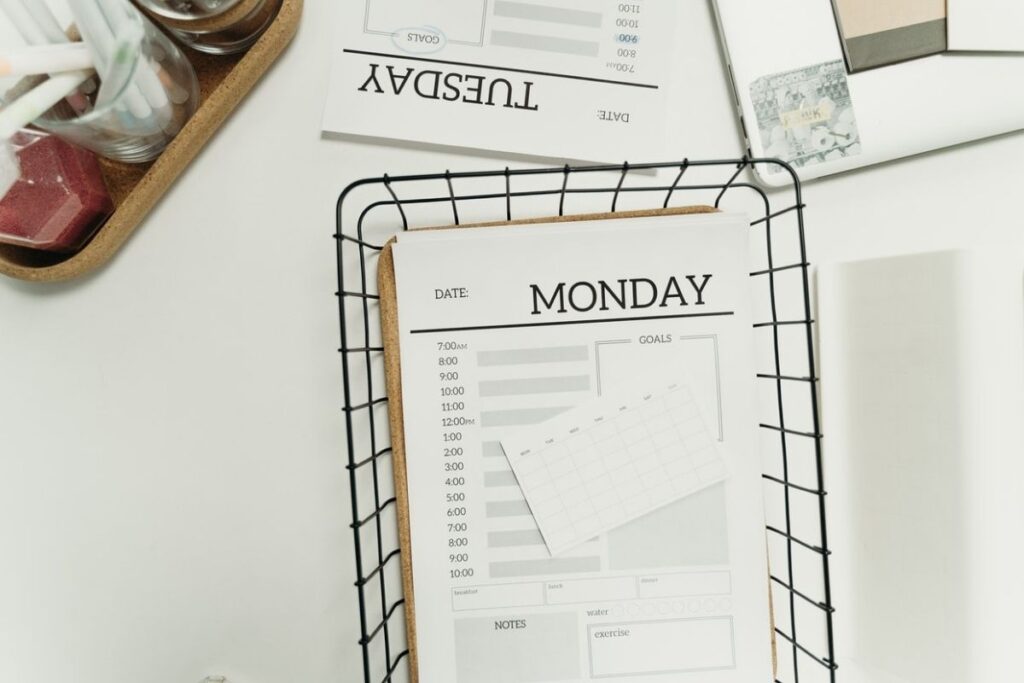Do you ever feel like some people get more done in a day than you do? It’s not because they’re more competent or smarter than you are. Instead, they’ve mastered time management, and with these tips, you can too!
Start Optimizing Your Time Management With a Time Audit
Apps such as TogglTrack make it easy to record everything you do and for how long. Then, after a few days or a week, take a look at the reports. You may find you spend a lot of time on a particular task that isn’t yielding desired results. That’s the place to start.
Set Time Limits
Creating reasonable time limits for tasks helps you focus and stay on track. If your time audit shows items that take longer than you’ve budgeted, try to figure out why. Then, reduce and remove any time-wasters.
The 4 D’s of Effective Time Management
Know Desired Results of Meetings
No one likes sitting in meetings when there’s other work to be done. Before scheduling a meeting, be sure you know the desired result and communicate this with your team. You’ll all stay on track and get back to the job more quickly.
Have a Daily Plan
Take the first 30 minutes of every day to create a plan for the day. Try to phrase items on it as if they’ve already been done. This mindset trick will help keep you motivated.
Organization Apps for Daily Living
Create a Weekly Plan
Weekly plans are important, too, as they help drive your daily plans. Create it on Sunday, so you’re all set to go on Monday morning. Remember what days/times you’re most productive and engaged, and schedule tasks appropriately.
Give Yourself Credit for “Off Task” Work
No matter your work environment, chances are that you have to deal with interruptions and “emergencies” that arise. While those items aren’t on any of your plans or to-do lists, you deserve to give yourself credit for getting them done. So create a “Done” list and jot those items down. You may just be surprised by how productive you were!
Minimize Distractions
If you’re working on something that requires focus, do your best to minimize distractions. For example, you may not be able to close your door, but you can turn off emails and IMs. Depending on the workplace and your role, you may also be able to hang a note asking people to come back at a particular time. Similarly, don’t answer the phone just because it’s ringing. Instead, make catching up on emails and voicemails a task during the day.
Productivity For How You’re Wired
Do It Now
Waiting for your muse to show up means nothing gets done. Instead, dive in! You can always go back and change things. Quite often, when you start working, the muse arrives to meet you there. Try tackling the most challenging items first. Eat That Frog! is a great book that offers ideas to organize and implement critical steps to stop procrastinating.
Single Tasking, Not Multitasking
Our brains aren’t wired to do more than one thing at a time. When you try to “multitask,” you’re switching from one thing to another and expecting your brain to keep up. This is detrimental to productivity. Learn more about this.

Don’t Sweat the Small Stuff
Trying to be perfect and focusing on every minute detail will only create unnecessary stress. Instead, keep the big picture in mind and know what you can let go of. And remember, mistakes are an opportunity to learn.
Stress Management in Under 2 Minutes
Optimize Waiting
Standing in lines, sitting in the waiting room, etc. – it can all feel like a massive time sink. Make the most of these times by being productive. Catch up on emails, read an e-book, listen to a podcast, meditate, etc. There are many ways to turn this time loss into a plus.
Schedule Breaks
Science has shown that the human brain can only focus on one task for 90 minutes at a time. So keep your brain fresh and avoid feeling burnt out by scheduling regular breaks throughout your day.
Use the Other Side of Your Brain
Most people use one side of their brain more often. But, if you learn to use both of them, you’ll boost your productivity and chances for success. For example, if you have a financial job, try doing something creative like painting or writing poetry. If you’re in a creative role, try martial arts or dancing.
Take Charge of Your Inbox
Cluttered email is a time waster and causes stress. Instead, organize your email and watch your productivity go up.
Get Enough Sleep
Tired brains are more easily distracted and have a more challenging time with recall. So while sleeping less to create more task-oriented time can seem like a good idea, it’s doing more harm than good.
Workout
The brain chemicals released during exercise help reduce stress. Type and intensity don’t matter. Try to get some form of workout at least every other day.
Ways to Stay Healthy as We Age
Schedule Down Time
The chances are that your brain is engaged from the time you wake up. While this can be useful, it can also slow down the creative process. Make some time every day to disengage. Go for a walk in the woods or park, visit an art museum, or meditate.
Use a Calendar or Planner
You’re taking control of your time by blocking off time and sticking to a schedule. Yes, meetings and appointments should be on there, but so should time for focused work, breaks, rest, etc. This also helps others in planning meetings. For example, if you show as “busy,” you’re less likely to get a meeting invite for a time when you need to focus on work to meet an important deadline.
We’ve created a 62-page planner to help manage your time. Get control of your time with our FREE planner to get you started.
6 Reasons You Need a Monthly Planner Today
Be Early
Plan to arrive early. That way, if you’re “late,” you’re actually on time—ditto with meeting deadlines.
Say No
Being asked can be flattering, but you’re not obligated to say yes. If the offer isn’t aligned with your mission and goals, say no. In the moment, saying something like “let me check my schedule and get back to you” can buy you time to make an informed decision.
Make it a Habit
Now that you have all the skills to optimize your time management, turn them into a habit. The more you do them, the easier they’ll be – and the more productive you will be.
Use Habit Stacking to Improve Your Finances
Is there a time management trick you love? Let us know in the comments.











